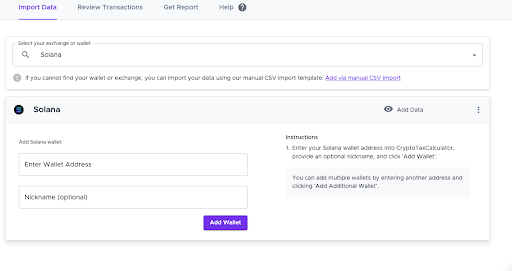Solana Tax Guide
Quick Start
Solana is a rising blockchain that is gaining traction amongst crypto enthusiasts. However, a common problem that users encounter is how to determine their tax obligations for Solana transactions. To help with this problem and reduce the complexity of crypto taxes for you, Crypto Tax Calculator has automated this process by developing an integration with Solana blockchain. Simply follow these steps to automatically import and categorize all your transactions.
- Find and copy your Solana Wallet address (This is generally found on your wallet manager).
- Log in to Crypto Tax Calculator and navigate to the ‘import data’ section. From here you can enter Solana into the search field or scroll down to find it manually
- Enter your Solana wallet address into Crypto Tax Calculator, provide an optional nickname, and click 'Add Wallet'.
 4. Once your Wallet has synced, you will see a green tick which means that Crypto Tax Calculator will have successfully pulled in your transaction history associated with this wallet from the Solana Blockchain.
4. Once your Wallet has synced, you will see a green tick which means that Crypto Tax Calculator will have successfully pulled in your transaction history associated with this wallet from the Solana Blockchain.

